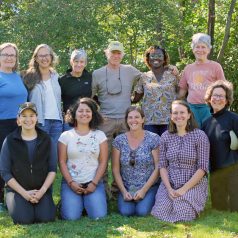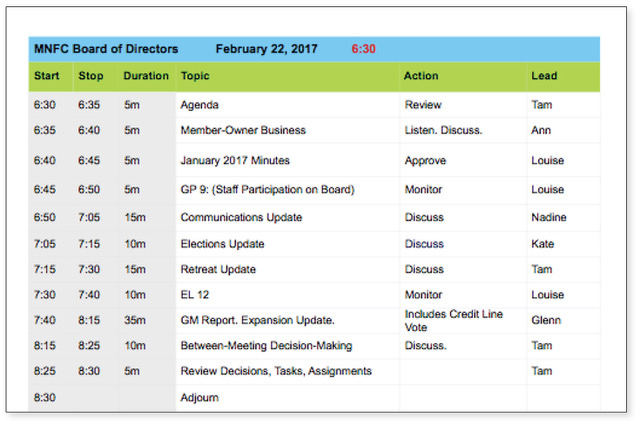
Meet Our New Board Members!
In June this year, we welcomed five new directors to our Board: Barbara Hofer, Caryne Eskridge, Cody Mears, Erika Dunyak, and Zan Goldblatt. They have jumped right into learning about our Board’s policy governance system, helping decide on this year’s patronage dividend, monitoring the annual Ends Report from our General Manager, and much more. Current Board Member Ollie Cultrara checked in with them to learn how they are bringing their unique perspectives to board governance work on behalf of MNFC member-owners. (Some of their comments were edited for clarity and brevity.)
What’s something that has surprised you in your first few months on the Board?
Barbara: I did a training with other new board members from around the country and was surprised to find out how unusual our Co-op is compared to many others. Many co-ops are struggling both financially and in terms of member involvement. We are thriving financially, we are able to refund patronage dividends to our member-owners, and we have competitive elections for our Board. I’m proud of what our members, managers and staff have created and nurtured over these many years, and I’m honored to be part of a group so committed to sustaining that success.
Cody: It has been exciting to learn more about how MNFC is meeting our Ends statement on Environmentally Sustainable and Energy Efficient Practices. Many efforts are being made to increase the usage of reusable containers as well as partnering with producers that have their own reusable totes, apple crates, etc. It’s been eye-opening to learn about the larger efforts of waste diversion for things like plastic film and cardboard due to the sheer volume of these materials that MNFC encounters on a daily basis.
Erika: I’ve been so impressed by the community and engagement of the Board. The Board members prioritize their positions on the Board and create space for folks to contribute and to learn. It’s a truly collaborative and respectful group of people.
What other hats do you wear, and how do those aspects of your life influence the perspective you bring to the Board?
Zan: Mother, Farmer, Communitarian; with those hats how could I not love the Co-op? As a parent I want to be sure I have great food to feed my kids. Maybe they don’t always eat it, but at least I tried! As a farmer I want to support my colleagues; I know how hard they work to put food on my table because my family works just as hard to put our lamb on theirs. As a communitarian, I am driven to invest in the things that make Addison County great. Part of loving the Co-op means doing my part to join in and make sure it stays vibrant.
Caryne: In all of my roles—pastor, mental health worker, and individual—building community is at the heart. I bring lots of experience in group dynamics and group processes, especially around accountability and repair. I got excited about running for the Board when I learned that the MNFC is a cooperative first, and a grocery store second. I’m looking forward to learning more about how that reality frames the work of the Board and of the MNFC more broadly.
Barbara: I’m a research psychologist writing about science denial, with strong concerns about climate change, and I’m appreciative of the Co-op’s deep commitment to environmental issues—and I think we could do better yet.
Cody: Between being a member-owner, working with outdoor retailers during my day job, and helping out on my family’s farm, the perspective I bring to board work is often seen through a few different lenses. I am leaning on my strong understanding of the retail environment and what it means to be a producer as I shape my approach to board work.
Erika: I’m an attorney, an entrepreneur, and an educator. My role on the Board gives me space to use all of these skills, whether we’re analyzing financial data to inform patronage dividend decisions or we’re ensuring our corporate governance compliance. I deeply understand the framework of cooperative structures and cooperative decision-making. It’s so fun to bring that expertise to the on-the-ground board meetings.
What does Cooperative Democratic Ownership mean to you?
Caryne: In January 2022, a few months after I moved to Vermont, I heard a Brave Little State podcast episode called “Why are Vermont co-ops so successful?” The journalists covered the history of co-ops in Vermont, founded on the idea that when neighbors come together they can meet more of their needs than if they acted alone. This remains quite a radical idea, and yet I witness it proven true over and over. MNFC is part of this tradition, and I love that this model keeps the purpose of the Co-op’s existence in the hands of the community. I ran for the Board because I want to learn more about how this model works and because I would love to see the “Democratic” element become even more active and broad.
Erika: My professional life centers on co-ops, so I think about this a lot. “Cooperative” says to me that, even while we don’t all agree, we have mutual respect and are working toward shared outcomes. “Democratic Ownership” means that the interests of the enterprise are held collectively, by all those who use the cooperative. That’s such a special thing. Business ownership is increasingly consolidated as mega corporations undercut prices and convenience while paying subsistence wages and emptying our downtowns. The success of MNFC is a testament to Addison County’s support of itself over Wall Street. We are all part of a resilient economy that feeds itself (literally and figuratively).





